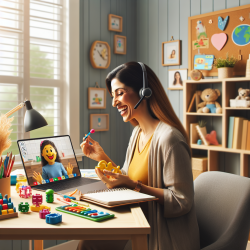As mental health professionals working in schools, we know how important it is to have the right tools to support our students effectively. At TinyEYE, we specialize in providing online therapy services that cater to the unique needs of each student. Today, let's dive into some practical tips for creating effective tools that can make a significant difference in your therapy sessions.
Understanding the Needs of Your Students
Every student is unique, and understanding their individual needs is the first step in creating effective tools. Whether you're working on an Individualized Education Plan (IEP) or providing speech therapy in schools, it's essential to tailor your approach to each student.
- Assess the Needs: Start by conducting a thorough assessment to understand the specific challenges and strengths of each student.
- Set Clear Goals: Based on your assessment, set clear, achievable goals that align with the student's needs.
- Customize Tools: Develop tools that are customized to help the student reach their goals. This could include worksheets, interactive games, or visual aids.
Incorporating Technology
Technology can be a game-changer in online therapy. Here are some ways to incorporate technology into your therapy sessions:
- Use Interactive Platforms: Platforms like TinyEYE offer interactive features that can engage students and make therapy sessions more effective.
- Leverage Apps: There are numerous apps designed for speech therapy and other forms of therapy that can be integrated into your sessions.
- Virtual Reality: Although still emerging, virtual reality can provide immersive experiences that help students practice skills in a controlled environment.
Engaging Parents and Caregivers
Parents and caregivers play a crucial role in the success of therapy. Here are some tips for engaging them effectively:
- Regular Updates: Keep parents informed about their child's progress through regular updates and reports.
- Provide Resources: Share resources and tools that parents can use at home to support their child's development.
- Involve Them in Sessions: Whenever possible, involve parents in therapy sessions to give them a better understanding of the techniques and tools you're using.
Evaluating and Adapting Tools
Creating effective tools is an ongoing process. It's essential to evaluate the effectiveness of your tools regularly and make necessary adjustments. Here are some steps to follow:
- Collect Feedback: Gather feedback from students, parents, and other professionals to understand what's working and what needs improvement.
- Monitor Progress: Use data to track the progress of your students and identify areas where tools may need to be adapted.
- Stay Updated: Keep yourself updated with the latest research and trends in online therapy to continually improve your tools.
By following these tips, you can create effective tools that enhance your online therapy sessions and support your students' growth and development. At TinyEYE, we're here to help you every step of the way. If you're ready to take the next step in providing exceptional online therapy services, reach out to us today!










